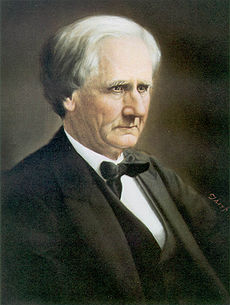Simon Cameron
Cameron's wartime tenure was marked by allegations of corruption and lax management, and he was demoted to Ambassador to the Russian Empire in January 1862.
[11][12] With his appointment to that position, Cameron, who had sold his stake in the Intelligencer and brought one in the Pennsylvania Reporter and Democratic Herald, divested himself of his interest in the printing trade and ceased to be an active journalist, though he ensured his state contracts would be transferred to his brother James.
Calhoun had broken with the administration, and Jackson convened the 1832 Democratic National Convention for the main purpose of endorsing a new running mate, Martin Van Buren of New York.
He was not successful, but the following year, Cameron prevailed on Jackson to give Pennsylvania's senior senator, William Wilkins, a diplomatic post, opening a seat that Buchanan might fill.
His success in getting Buchanan elected on the fourth ballot pleased both the new senator and Vice President Van Buren, and increased his influence in Washington.
[20] Still seeking a federal position, he asked Buchanan for help being appointed a commissioner under the 1837 treaty with the Winnebago Indians, who ceded land in exchange for payments to tribe members as well as to those who had part-Native American descent.
According to Cameron biographer Paul Kahan, "the lack of evidence, coupled with the vague assertions of corruption, became a hallmark of this scandal, and it is one of the reasons why it is so hard for historians to assess who was actually telling the truth.
"[21] According to another biographer, Erwin S. Bradley, "briefly, Cameron's part in the Winnebago affair may be stated as follows: he did exceed his instructions and showed poor business acumen in failing to require bond of the third parties intrusted with the certificates; but the charges ... remain unproved".
The defeat of Van Buren for re-election in 1840 divided Pennsylvania Democrats into those who backed the former president to run again in 1844, and those who supported the administration of Governor David R. Porter.
[32][33] Cameron began his first term in the Senate with little long-term support in the legislature, since he was alienated from many of the Democrats and was viewed by the Whigs as the lesser evil to Woodward, to be replaced in better times.
[34] Alleging that Cameron had gained the seat by corrupt means, the Democratic caucus sent letters to Vice President George M. Dallas (a Pennsylvanian) and also to Buchanan.
[35] The two officials, in their replies, refrained from attacking Cameron personally, though they decried the lack of party loyalty which made his election possible.
Angered, Cameron struck back, defeating the nomination of Henry Horn to the lucrative position of Collector of Customs for the Port of Philadelphia, which Polk pressed repeatedly.
[46] The Whigs nominated General Zachary Taylor of Louisiana for president, with his running mate former congressman Millard Fillmore of New York.
Cameron apparently had no supporters in the Democratic caucus; he received no votes in the legislature's balloting for senator, in which Whig James Cooper was elected.
[49] This did not mean he cloistered himself from politics; his business activities, including railroads and banking, routinely brought him into contact with politicians, and he retained his interest in public affairs.
[50] The Democrats recaptured the state legislature in 1850, and Cameron hoped to succeed Sturgeon in the election the following January, but failed to gain enough votes.
In 1850, trying to diminish any southern support the former secretary might get, Cameron sent Mississippi Senator Jefferson Davis a thirty-year-old news article showing that Buchanan had signed an anti-slavery petition.
With Buchanan the Democratic nominee for president, and Pennsylvania a crucial state in the election, Cameron was considered as Frémont's running mate, but William Dayton was chosen.
Buchanan won Pennsylvania by fewer than three thousand votes, and Frémont blamed the decision not to choose Cameron as critical to the outcome.
[64] The divisions manifested themselves during the Senate's debate over whether to adopt President Buchanan's recommendation that Kansas Territory be admitted to the Union under the pro-slavery Lecompton Constitution.
[65][66] Nevertheless, remembering the recent beating of Charles Sumner, Cameron made a pact with Zachariah Chandler of Michigan and Benjamin F. Wade of Ohio that they would take each other's part in another such incident.
Kahan suggested that the fact that Cameron hosted both Seward and another presidential hopeful, Governor Salmon P. Chase of Ohio, in 1859, meant that he was trying to keep good relations with the major contenders for the nomination and place himself in a position to be a kingmaker.
[87] In August, Cameron wrote to the presidential candidate, pledging that Pennsylvania would vote for him, and "the state is for you and we all have faith in your good intentions to stand by her interests".
On Election Day, November 6, 1860, Republicans flipped Pennsylvania to their party, something confirmed by a telegram from Harrisburg to Lincoln's headquarters in Springfield after midnight, "Hon.
Both men were personable in nature, and the meetings were enjoyable; at their conclusion, Lincoln offered Cameron a place in the cabinet, either as Secretary of the Treasury or of War.
[citation needed] Under threats of destruction or confiscation from the Governor of Virginia and mayor of nearby Charles Town, B&O president John Work Garrett asked Cameron to protect the B&O.
[citation needed] These problems were partially alleviated by the summer 1861 Union victories at Philippi and Rich Mountain, and vigorous army and company work crews which reduced the main line gap to 25 miles between Harpers Ferry and Back Creek.
[119] The Stalwarts were ultimately thwarted when the Blaine faction formed an alliance with the Half-Breeds to nominate James A. Garfield, who would triumph in the general election over Democratic opponent Winfield Scott Hancock.
Cameron's brother James was a colonel in the 79th New York Volunteer Infantry, and was killed in action at the First Battle of Bull Run on July 21, 1861.


